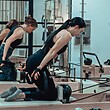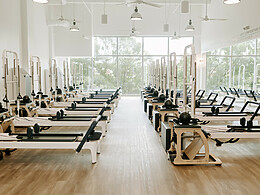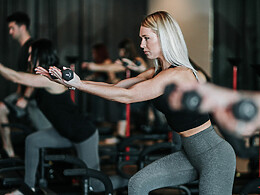
Trying to maintain a healthy lifestyle and workout consistently is a high priority in my life. So when I heard that recovering after a tough workout is just as important as the workout itself, I needed to find out all the details. I went straight to the expert Adam Petropolis, District Manager of Core Concepts Personal Training at Mountainside Fitness in Mesa. Growing up, Adam participated in everything from basketball, baseball and football to wrestling and track and was motivated to become faster and stronger than his competition. Pursuing his dream, Adam graduated from ASU with a bachelor of science in Exercise and Wellness. Adam gives us the lowdown on everything you need to know about recovering post workout…
Trainer Q&A: Adam Petropolis District Manager of Core Concepts Personal Training at Mountainside Fitness
Q: It’s leg day and you are extremely fatigued, what would be the best way to recover those muscles?
A: Recovery is multi-faceted (Local and systematic) You need to replace lost electrolytes and hydrate, fuel your body with Macro-Nutrients, and speed the recovery of the muscles by improving circulation to the area through mobility, massage, foam rolling or hot/cold therapy.
Q: What are some foods that you recommend eating after a workout?
A: Although, most magazines and supplement companies will lead you to believe that “protein” is the Holy Grail for post workout food/ fuel, the reality is, carbohydrates are just as important, if not more important, to replenish your body’s fuel tanks. One of the BEST post-workout “foods” to consume is chocolate milk. Yes, Chocolate Milk. The appropriate ratio of protein to carbohydrates for post workout recovery is 1:4 or 1:3 and chocolate milk is almost the perfect balance and will speed recovery. A Smoothie with fruit and protein is also a great post workout staple as well.
Q: How much water should you consume in order to recover?
A: A good rule of thumb is ½ oz. per lb. of body weight per day. So, a 200lb male should consume at least 100oz per day. Keep in mind, a water loss of even 2% can significantly reduce performance and increase risk for soft tissue injuries (pulls, strains etc.). This is very important to remember during our hot AZ summers.
Q: Does sleep play a key role in recovering post workout?
A: Most definitely! Sleep is where your body releases hormones essential to recovery. The old “8-hours per night” is probably a good starting point, but everyone is different. Try to determine what works for you and your lifestyle. But, don’t neglect sleep because you CANNOT make up for lost sleep by sleeping more on another day…
Q: How do you conquer soreness?
A: Soreness is classified as DOMS – Delayed Onset Muscle Soreness. The better shape you are in, or the more “adapted” you are to your workouts, the less soreness you will experience. General improved circulation through some of the modalities I mentioned earlier (stretching, hot and cold therapy etc.) are the best ways to reduce soreness.

Thanks to Adam, I now know how to properly recover my body after a tough workout. No excuses right?










